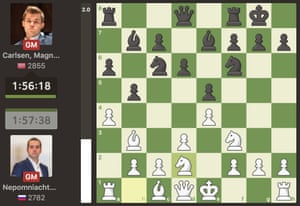13:10
Carlsen chooses 15. … Nc6 and Nepomniachtchi settles in for his longest think of the game so far. After more than five minutes, he goes with 16. Rc1. The engines say a5 is the best response for the champion, who’s been inspecting the position for the last six minutes (and counting).
Updated
13:01
Nepomniachtchi plays 12. Bd2 in less than three minutes. Dutch grandmaster Anish Giri says the challenger’s pace suggests he still in his opening preparation. The next series of moves includes the first capture of the game (12. Bd2 Bf8 13. Ne3 Ne7 14. c4 bxc4) after which both players walk away from the board.
After a brief spell, Nepomniachtchi and elects to recapture with his knight (15. Nxc4)
The position after 15. Nc4. Photograph: Chess.com
Updated
12:48
Carlsen thinks for more than five minutes before settling on 10. … Re8. Another rare move by the world champion! That’s the fifth most popular choice (after Na5, Nd7, Qd7 and h6). For the third straight game to open this world title tilt, Carlsen is the first player to mix things up with an unusual move.
Nepomniachtchi takes more than four minutes before responding with 11. Nf1. Carlsen counters with 11. … h6.
Updated
12:40
Nepomniachtchi steps away from the board after the opening flurry. Carlsen takes about a minute before playing 8. … Bb7. Following the next series of moves (9. d3 d6 10. Nbd2), Carlsen has pondered this position for the last three minutes (and counting).

The position after 10. Nbd2. Photograph: Chess.com
12:34
Game 3 is under way!
Nepomniachtchi playing with the white pieces opens with 1. e4. The players blitz out their following moves (1. … e5 2. Nf3 Nc6 3. Bb5 a6 4. Ba4 Nf6 5. O-O Be7 6. Re1 b5 7. Bb3 O-O 8. a4). Same as Friday’s first game, it’s another anti-Marshall, a branch of the Ruy Lopez opening.
Updated
12:15
The format
A quick refresher on the format for this world championship match. It will consist of 14 classical games with each player awarded one point for a win and a half-point for a draw. Whoever reaches seven and a half points first will be declared the champion. (Both Carlsen and Nepomniachtchi are on one point after draws in Friday’s Game 1 and Saturday’s Game 2.)
The time control for each game is 120 minutes for the first 40 moves, 60 minutes for the next 20 moves and then 15 minutes for the rest of the game plus an additional 30 seconds per move starting from move 61.
If the match is tied after 14 games, tie-breaks will be played on the final day (16 December) in the following order:
• Best of four rapid games with 25 minutes for each player with an increment of 10 seconds after each move.
• If still tied, they will play up to five mini-matches of two blitz games (five minutes for each player with a three-second increment).
• If all five mini-matches are drawn, one sudden-death ‘Armageddon’ match will be played where White receives five minutes and Black receives four minutes. Both players will receive a three-second increment after the 60th move. In the case of a draw, Black will be declared the winner.
Notably, Carlsen’s second and third title defenses both came down to tiebreakers. But many believe the increased length of this year’s match (from 12 to 14 games) and the stylistic matchup at hand promises a decisive result in regulation.
Updated
11:56
Preamble
Hello and welcome back for Game 3 of the World Chess Championship. We’re back for a third straight day following a pair of draws in Game 1 and Game 2 that were notable for longtime champion Magnus Carlsen making early pawn sacrifices in exchange for long-term initiative. In either case, Ian Nepomniachtchi’s opening advantage ultimately didn’t hold up and he was forced to rely on precise endgame play to emerge with a result.
The general consensus around today’s highly anticipated third encounter is that both Nepomniachtchi (who will be marshaling the white pieces) and Carlsen (playing with black) will have a real go at a decisive result before the first rest day of the match on Monday.
For those of you just coming aboard, Carlsen, 30, has been at No 1 in the Fide rankings for 10 straight years and was considered the world’s best player even before he dethroned Viswanathan Anand for the title in 2013. Nepomniachtchi, 31, is ranked No 5, having earned his place at the table by winning the eight-man candidates tournament in April with a round to spare. It’s the culmination of a rivalry that started nearly two decades ago when they first met across the board as boys at the 2002 European Under-12 Championship in Peniscola, Spain. Notably, Nepomniachtchi enters the title tilt with a winning lifetime record against Carlsen in classical matches (four won, one lost and eight drawn). That makes him unique among today’s top players, even if two of those victories came in youth championships.
The best-of-14-games match is scheduled to take place at the Dubai Exhibition Centre over the next three weeks, with the winner earning a 60% share of the €2m ($2.26m) prize fund if the match ends in regulation (or 55% if it’s decided by tie-break games).
We’re a little more than a half hour from today’s first move, so not much longer now. In the meantime here’s our Sean Ingle’s interview with Carlsen from earlier this week.
Updated
